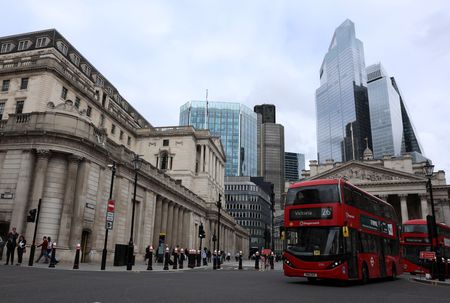By David Milliken
LONDON (Reuters) – It is still not clear whether higher U.S. tariffs on goods imports proposed by U.S. President-elect Donald Trump would raise or lower British inflation, Bank of England policymaker Megan Greene said on Thursday.
“None of us know exactly what those tariffs might look like. We can’t even work out which direction tariffs would push inflation, in particular in the UK and also in the euro zone to some degree,” Greene said at a panel discussion hosted by the Financial Times.
Trump has floated blanket tariffs of 10% to 20% on virtually all imports when he returns to the White House in January and this week pledged big tariffs on Canada, Mexico and China too.
Greene, a U.S. and British national, said Britain could find it hard to balance trade ties with the United States and the European Union and “might end up having to choose”.
Some economists have said higher U.S. tariffs on imports, especially from China, could lead to them being diverted to Britain at a discount price.
Greene voted with the majority of the BoE’s Monetary Policy Committee last month to cut interest rates to 4.75% from 5%, after opposing the BoE’s first rate cut of the cycle in August.
Speaking on Thursday, Greene said she saw some risk that inflation would not return to its 2% target over the next three years, due to uncertainty about tariffs, the impact of higher employment taxes in the government’s last budget and more general stickiness in domestic inflation pressures.
“Services inflation has remained stubbornly high. That’s underpinned mostly by high wage growth. Wage growth has been coming down as well, but not as quickly as I would have liked,” Greene said.
British consumer price inflation was 2.3% in October and the BoE expects it to rise to close to 3% next year because of a range of pressures including the fading impact of last year’s energy price falls and front-loaded stimulus in the budget.
Annual wage growth excluding bonuses was 4.8% in the third quarter – a two-year low but well above the 3% rate which many MPC members view as consistent with 2% inflation.
(Reporting by David Milliken; Editing by Sachin Ravikumar, Alexandra Hudson)
